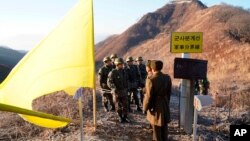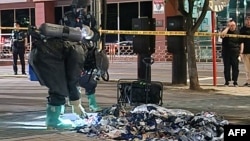South Korea fully suspended an agreement meant to reduce tensions with North Korea, defense officials said Tuesday, allowing Seoul to resume all military activities along the inter-Korean border.
The decision, approved by South Korean President Yoon Suk Yeol, is part of Seoul’s response after Pyongyang sent waves of balloons filled with trash and excrement over the South.
The decision frees South Korea to resume military drills, including live-fire exercises, along the border and near frontline islands. It also allows for the resumption of loudspeaker propaganda broadcasts into the North.
Inter-Korean tensions escalated last week after hundreds of North Korean balloons dropped garbage – and reportedly feces – on busy streets, in front of residences, and in other public areas across South Korea.
North Korea says its trash balloons were retaliation after a prominent, South Korea-based human rights activist, launched balloons carrying anti-North Korea pamphlets and Korean pop culture content into the North.
South Korea’s military said it has found nearly 1,000 “filth balloons,” which were sent in two separate waves. It says North Korea has also been blocking GPS signals in border areas.
In a statement Tuesday, South Korea’s military said the North’s actions “seriously threatened the safety of our people” and vowed to “firmly punish” any future provocations.
“The government has decided to suspend all of the ‘919 military agreements’ so that our military is no longer restricted in their activities to protect the lives and property of the people,” the statement said.
“Responsibility for this situation lies entirely with the North Korean regime,” it added, without specifying which military activities would resume along the border or when.
South Korean media report that officials may resume loudspeaker broadcasts, which contain criticism of North Korea’s human rights record and forms of entertainment forbidden in the North.
North Korea is governed by a third-generation hereditary dictatorship that views virtually all outside information as an existential threat. Pyongyang has promised to halt its trash balloon launches as long as no anti-Pyongyang materials are sent northward.
But Park Sang-hak, the North Korean defector activist who heads a group called Fighters for a Free North Korea, vowed to continue sending his balloons unless North Korean leader Kim Jong Un apologizes for his “evil acts.”
“If you do not apologize, we will retaliate a thousand times – ten thousand times – more than what you have done,” Park said in a statement.
South Korean officials have at times argued that they cannot stop every individual from sending leaflets into the North. Their ability to regulate such launches was further hampered in September, when the country’s Constitutional Court struck down a law banning such launches.
The developments appear to put both Koreas on a path to escalation, said Chad O’Carroll, the Seoul-based founder of NK News, a website focused on North Korea.
According to O’Carroll, North Korea appears determined to coerce South Korea into stopping the northward launches.
“Outside information is really ideological contamination, it's like a cancer. It's a serious Achilles heel for Kim Jong Un,” he said. “And I think this latest action is a function of that hypersensitivity.”
If South Korea were to resume propaganda broadcasts, that could prompt an even firmer response by the North, O’Carroll said, citing a 2015 incident in which North Korea fired a projectile toward a South Korean loudspeaker.
“If they do that, we could see a greater chance for North Korea to consider some limited form of kinetic military action to stop loudspeakers or to stop the growth of this unofficial information coming into the North."
In 2018, the two Koreas agreed to stop a wide range of border provocations, including military drills and propaganda broadcasts. However, that deal, known as the Comprehensive Military Agreement, has been eroding for years.
Most notably, North Korea in late 2022 sent five small reconnaissance drones across the border, with one making it all the way to the northern edge of the capital, Seoul.
After the North successfully placed its first spy satellite into orbit in November, South Korea stepped away from parts of the agreement. In return, Pyongyang said it would never be bound by the deal.
The CMA was perhaps the most concrete outcome of the 2018-19 diplomacy between the two Koreas, which saw three meetings between Kim and his then South Korean counterpart, President Moon Jae-in.
The conservative Yoon has expressed disdain for the agreement, slamming what he calls the “fake peace” initiative of his liberal predecessor.





